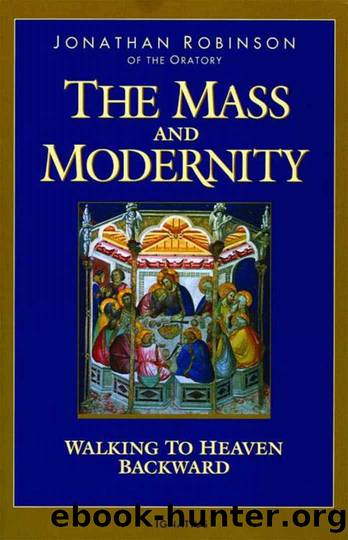Mass And Modernity by Fr. Jonathan Robinson

Author:Fr. Jonathan Robinson [Robinson, Fr. Jonathan]
Language: eng
Format: epub
Tags: Spiritual & Religion
ISBN: 9781586170691
Publisher: Ignatius Press
Published: 2010-11-19T06:00:00+00:00
PART THREE
THE LAMBâS HIGH FEAST
At the Lambâs high feast we sing
Praise to our victorious King,
Who has washed us in the tide
Flowing from his pierced side;
Praise we him, whose love divine
Gives his sacred blood for wine,
Gives his body for the feast,
Christ the victim, Christ the priest.
âAmbrosian hymn, seventh century
The Church at her deepest, truest level is the living presence of Christ working among us, and in us, through his sacraments. Christ came to share in our humanity so that every one of us could become partakers of his divinity. We are presented with this truth every time we go to Mass and the priest says at the offertory: âBy the mystery of this water and wine may we come to share in the divinity of Christ, who humbled himself to share in our humanity.â1 We may not always sense his presence; there will be times of obscurity and darkness; but in a faithful and serious sacramental life, we know that God is gradually remaking us into the image of his beloved Son. And, just as the Father was well pleased with the Son, so he will be well pleased with usâif we remain in the Son.
In harmony with this understanding of the Church and sacraments, we have already noted2 that Vatican II taught that the liturgy is the summit of all the Churchâs activities and the source from which all her power flows and that, in the liturgy, âthe work of our redemption is accomplished.â3 The Catechism of the Catholic Church takes up this theme and quotes Vatican IIâs Constitution on the Sacred Liturgy, saying that the liturgy gives to the faithful the power to bring home to themselves and to others âthe mystery of Christ and the real nature of the true Churchâ.4 Liturgy matters, then, because it is vital to the Catholic understanding of what it means to lead a Christian life.5 Liturgy is related to Christian truth, and Christian truth is required for what Plato called âliving wellâ.6 One of the themes of The Mass and Modernity is that to live a good life requires a difficult and ongoing effort to âseek the things that are aboveâ (Col 3:1) and that the worship of the Church is supposed to do just that: to remind us of the things that are above and to help us seek them. But, furthermore, the liturgy is not going to do this unless what actually goes on in church is based on Christian truth and can be seen to be based on Christian truth.
There is an old saying, dating from the Indiculus, attributed to Prosper of Aquitaine, written about 435-442,7 to the effect that what is believed can be seen from the prayer of the Church. Lex orandi, lex credendi; that is, literally, the law of prayer is the law of faith. Sometimes this principle was used to argue that we could base the faith itself on the liturgy of the Church. This is not, however, what the Council of Ephesus said; in
Download
This site does not store any files on its server. We only index and link to content provided by other sites. Please contact the content providers to delete copyright contents if any and email us, we'll remove relevant links or contents immediately.
Never by Ken Follett(2882)
The Man Who Died Twice by Richard Osman(2300)
Machine Learning at Scale with H2O by Gregory Keys | David Whiting(2292)
Fairy Tale by Stephen King(2071)
Will by Will Smith(2043)
Reminders of Him: A Novel by Colleen Hoover(1881)
Rationality by Steven Pinker(1765)
The Stranger in the Lifeboat by Mitch Albom(1532)
The Becoming by Nora Roberts(1331)
Friends, Lovers, and the Big Terrible Thing by Matthew Perry(1328)
New Morning Mercies: A Daily Gospel Devotional by Paul David Tripp(1325)
A Short History of War by Jeremy Black(1300)
HBR's 10 Must Reads 2022 by Harvard Business Review(1256)
The Strength In Our Scars by Bianca Sparacino(1248)
The Fall of Babel by Josiah Bancroft(1236)
Can't Hurt Me: Master Your Mind and Defy the Odds - Clean Edition by David Goggins(1227)
515945210 by Unknown(1208)
Fear No Evil by James Patterson(1109)
Love on the Brain by Ali Hazelwood(1098)
